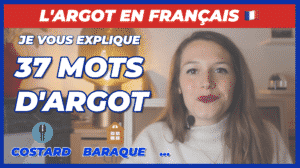Transcript
When you learn a foreign language, there are little words that make the difference. These are words that will show that you have a little bit more knowledge of the language, a little bit more refined knowledge.
It's these words that will help you speak a little more, that will bring you closer to the language spoken by a native speaker.
Welcome to this new video. I hope you're in good shape.
Today, we're going to look at some vocabulary alternatives to using the word très. These stronger words and adjectives will add finesse to your language, taking you to the next level in the French language you use.
They allow you to emphasize a condition or characteristic without using the adverb very.
In French, for example, you might say someone is very thin. But you can also say they're skinny. It's the right vocabulary word that's a little stronger than mince. I don't know about you, but when I'm a bit short of vocabulary, I do just that.
I'm going to add some small words to add nuance.
For example, in English, I'll always use the word "very" plus an adjective because I don't have the word with a bit more intensity. By the way, to correct this a little and improve my English, I know that some of you have also written to me about the subtitles I put in the English videos, which aren't always perfect.
So I started taking English lessons on a platform called Lingoda. I'm telling you about it today because I know that you too often write me messages asking where you can take French lessons, or asking me if I give French lessons.
I don't teach French. I don't have the time, unfortunately. But there are platforms like Lingoda that are really great for taking courses in foreign languages. It's true that I watch a lot of films and series in English, that I read articles in English, but it's a fairly passive way of learning the language.
By taking courses like I've started on Lingoda, it's true that I'm learning the language more actively. You can take one-to-one lessons with a teacher or in small groups of up to six people.
And you can choose course topics to suit your level and needs. You can, for example, take grammar classes on specific points, but you can also choose themes that appeal to you. There are conversation tables on topics such as tattoos and piercings, or adolescence, or travel.
And then you'll be able to discuss it with other students and a native teacher. As it's online, there are teachers who are native French speakers, but who live all over the world. So you can take classes, for example, at 7 in the morning or very late at night.
There are teachers available at all hours of the day, which I find very practical.
In any case, summer is just around the corner and you may be planning a vacation in a country where French is spoken. So now's the time to start learning French a little more actively if you want to make progress.
So let's get back to the subject of video, words and alternatives to the inopportune use of very.
Instead of saying something or someone is very ugly, you can say it's hideous or hideous to a girl.
Hideous is a stronger adjective than ugly. You want to emphasize that something is ugly. For example, I can say the color of this dress is really ugly or the color of this dress is really hideous.
Conversely, if you want to say that something is very beautiful, you can use the words magnifique or sublime. You see, these are slightly more complex words that will make your language a little closer to that of a native speaker.
I can say this dog is beautiful or this dog is gorgeous, this dog is sublime.
When you want to talk about something or someone that's very small, for example, I don't know if you're familiar with designer Jacquemus' handbags. He makes handbags that are really tiny. They're very small. You can also say these handbags are tiny.
Conversely, if you want to say something is very big, you can say it's giant or something is giant. I can say giant or immense. My brother-in-law is huge. He's 2 metres 20 or my brother-in-law is giant, he's 2 metres 20. These are stronger words than big.
When you're very tired from your day's work, you might say I'm exhausted, I want to go to sleep. To be exhausted is to be very tired.
Instead of saying I'm very scared, you can say I'm frightened or I'm terrified. It's stronger than being afraid. I'm terrified, I'm afraid of the dark. You can also say you're scared, if you're very scared, that's stronger than saying you're scared.
Say you're scared by horror movies or scared when you see a dog, for example, because you're very afraid of dogs.
When you're very upset, very angry because someone, for example, has upset you, you can say you're furious. I'm furious because someone ran into my car. When you're furious, you're really very angry. You're really pissed off.
The next adjective is dirty. If I say it's very dirty that, for example, I rented an Airbnb that was very dirty. I can also use the word immonde. The Airbnb room was filthy. You can also say that Airbnb was disgusting or the room was disgusting.
When something is very annoying, for example people making noise while eating, it's really very annoying. If you want to go even further than annoying, something that is very annoying is something that is unbearable. People who make noise while eating are unbearable.
When you laugh a lot, for example, if you go to see a very funny play, you can say it's hilarious. Something hilarious is something very funny.
Let's move on to the alternatives, to something very hot and something very cold. When something is very hot, you can say it's boiling. I hate it when my coffee is lukewarm. I like my coffee boiling. You can use this word instead of very hot.
And instead of very cold, you can use the word frozen. When something is frozen. When there's frost, it means there's snow. If you say something is frozen, it really means it's very cold. For example, if you go to the sea and put your foot in the water, you can either say that the water is very cold, or you can say that it's frozen. The water's frozen, I can't swim.
When something is very good, for example, a dish you're enjoying, you can say it's excellent. This dish is excellent. It means it's very good. We've already seen this in a previous video, but instead of saying you're very hungry and very thirsty, you can say you're hungry and thirsty.
I'm thirsty, I'm very thirsty because I've been walking for four hours in the desert. Likewise, if you're starving, it's because you're very hungry.
If you have a friend or you yourself are very smart, instead of saying you're very smart, you can say you're brilliant.
When someone is very sad a lot of the time, it means they're devastated, depressed. You can use these words instead of very sad. If you're very sad, you can also say that you're down about something.
Greg is down, he's devastated, he's depressed because Cynthia left him.
Something very bad. For example, if you eat something, which is really not good at all which is very bad, you can say it's horrible.
If you want to talk about an object that's very big, that's very bulky, that takes up a lot of space. For example, if you've ordered a new wardrobe and put it together, instead of saying it's very big or very tall, you can say it's huge.
Something huge is really something very big or very big. And finally, one last word, although there are many more, is rich.
It's a little difficult to pronounce this word richissime. We use it to talk about someone who is very rich. For example, I might say: after winning the lottery, this man has become very rich. That means he's not just rich, he's really very rich.
That's it for today. I hope you've enjoyed this video, and that it's helped you develop your French vocabulary.
If you liked the video, of course, put a "like". And if you're new, subscribe so you don't miss any of the videos. See you soon.








